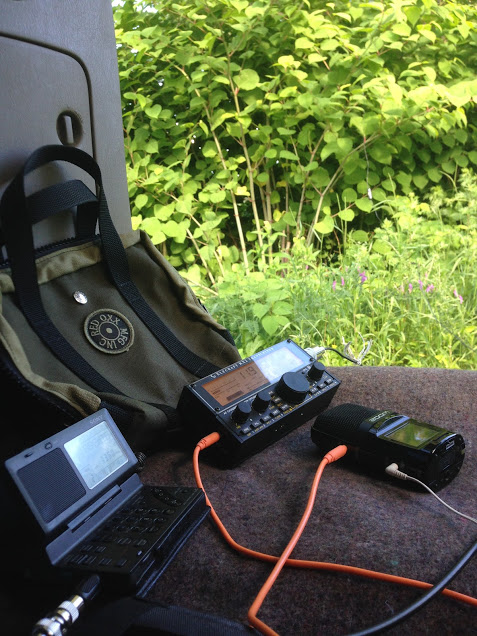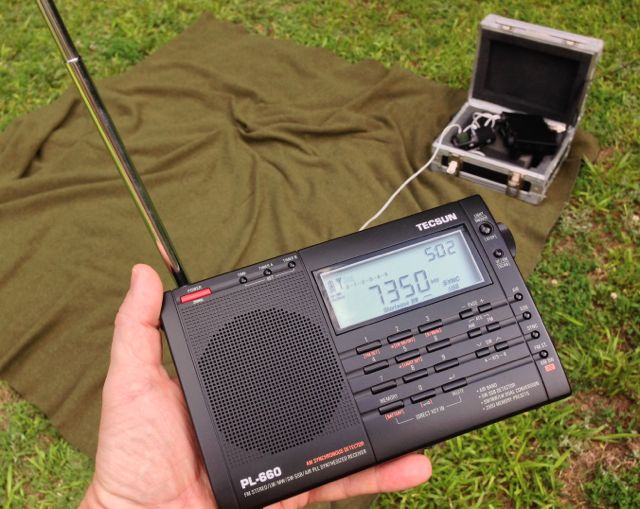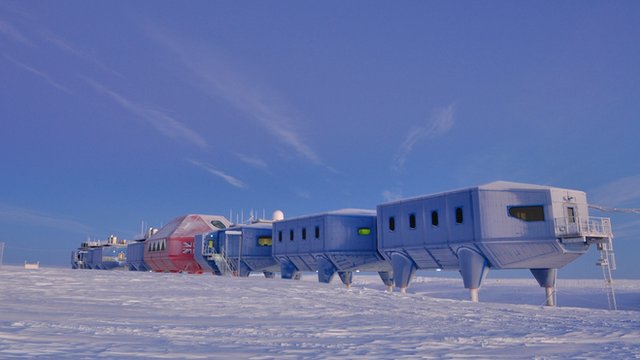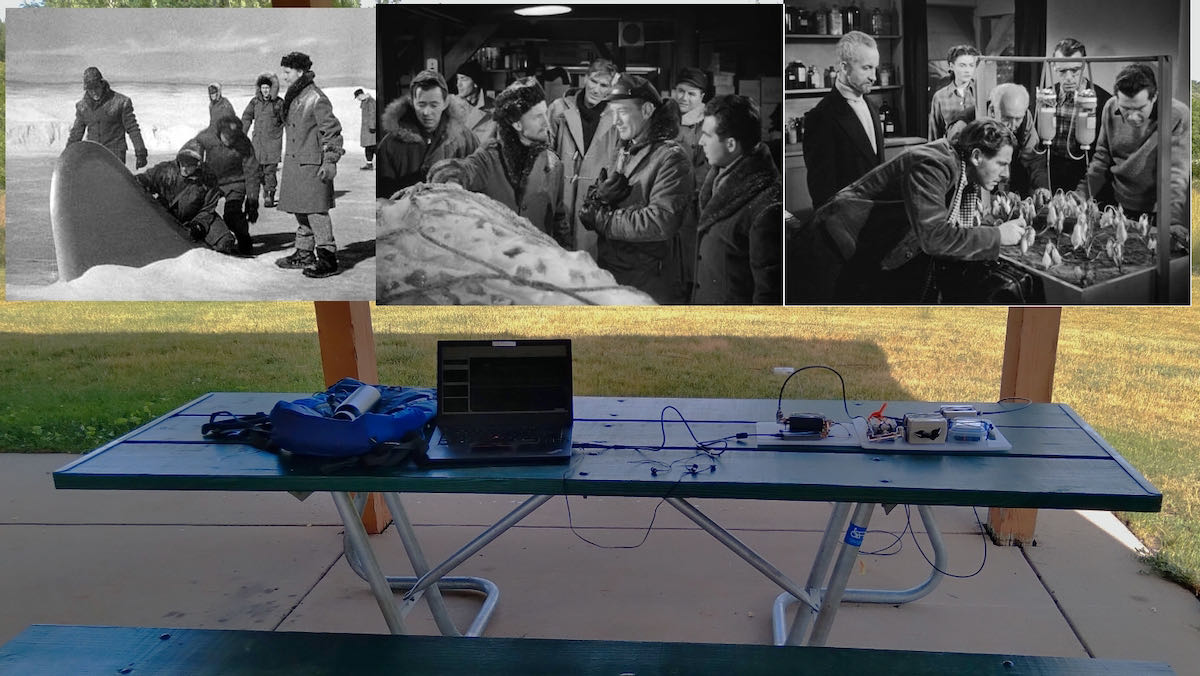In the comments section of this post, I’d like you to share your recording of the BBC Midwinter Broadcast to Antarctica!
In years past, I’ve created a post with all of the Midwinter recordings curated in one article. This usually takes me 12+ hours to prepare over a couple of weeks as many of the audio clips and video recordings must be formatted for the site and embedded. There is also a lot of discussions back/forth confirming details with listeners. This year, my schedule is such that if I try to piece one of these articles together I might not have it published for many, many weeks. That and I will not have reliable internet service over the next couple of weeks.
Instead, I’d like to try something new!
Please comment with your recording on this post!

Listening to the 2017 BBC Antarctic Midwinter Broadcast from the back of my vehicle in Saint-Anne-de-Beaupré, Québec, Canada.
I’ve created this dedicated post where you can comment and include links to audio and video of your 2021 Midwinter Broadcast recordings. This will allow you to post your logs and recordings at your convenience without my availability becoming the bottleneck.
Here’s the format I’d like you to leave in your comment of this post:
Name:
Listening location:
Notes: (Include frequencies and any details about your receiver and antenna.)
Link to audio or video: (YouTube, Vimeo, Internet Archive, SoundCloud, etc.)
Video and Audio Recordings
 There is no way to directly upload audio in your comments, however, you can link to the recordings if you upload them to the Internet Archive (which I’d highly recommend) or any of the video streaming services like YouTube and Vimeo–or audio services like SoundCloud.
There is no way to directly upload audio in your comments, however, you can link to the recordings if you upload them to the Internet Archive (which I’d highly recommend) or any of the video streaming services like YouTube and Vimeo–or audio services like SoundCloud.
If you have a photo you’d like to include in your comment, send me an email from the same address you used in your comment. I’ll manually post the image at the top of your comment when time allows.
As with each year, I’ll make sure the BAS team and the BBC receive a link with all of your recordings!


I’m Giuseppe Morlè iz0gzw,
also this year I listened to the BBC broadcast WS Antartic Midwinter dedicated to the members of the Halley Science Base in Antarctica …
I used my case with the Tecsun S8800 and built-in loops / Styles and the Tecsun pl 660 also hooked to the system …
Very good listening on Ascension 6170 and Woofferton 7305 …
evanescent but understandable about Dhabbaya 6035 and Woofferto 9505 …
You can see the video on my Youtube channel at the following link:
https://youtu.be/D9FbmeK-r2E
My briefcase proved to be a good portable listening station with its built-in antennas.
Thanks to you and a greeting from Italy.
Ciao. Giuseppe.
I have partial video and a 95% of audio transmission. ya want both? 😉
Name: Chris Mackerell
Listening location: Marahau, Tasman Bay, New Zealand
Notes: All four frequencies noted using my Elad DUOr receiver and Wellbrook ALA-1530S+ loop antenna.
Best signal 7305 kHz: https://www.dropbox.com/s/9pi1rxttnl19itq/20210621%202130-2200%207305%20kHz%20WOF%20Sync-AM.mp3?dl=0
9505 kHz also good, but required using just the upper sideband to avoid splash from 9500 kHz: https://www.dropbox.com/s/m223ianwmj375gf/20210621%202130-2200%209505%20kHz%20WOF%20ECSS-U.mp3?dl=0
6035 kHz weak but audible: https://www.dropbox.com/s/npfgpa1mu91na9s/20210621%202130-2200%206035%20kHz%20DHA%20Sync-AM.mp3?dl=0
6170 kHz: just a blip on the SDR spectrum – no usable audio: https://www.dropbox.com/s/ezzxae7fy3bll5w/20210621%202130-2200%206170%20kHz%20ASC%20AM.mp3?dl=0
I have uploaded my recording of the complete broadcast to the SRAA:
https://shortwavearchive.com/archive/bbc-world-service-annual-antarctic-midwinter-broadcast-june-21-2021
Here is the accompanying text:
A live, off-air, half-hour recording of the BBC World Service special Antarctic Midwinter Broadcast on 21 June 2021 beginning at 21:30 UTC. The broadcast, hosted by Cerys Matthews, featured messages and music for the staff of the British Antarctic Survey (BAS) overwintering in Antarctica. In addition to personal messages from family and friends, there were special messages from BAS personnel and others including one from Sir David Attenborough accompanied by a blackbird. The transmitter had a “crash start” and the first two words of the introductory announcement (“This is”) were cut.
The recording is of the transmission on a frequency of 7305 kHz from the BBC’s Woofferton, England, transmitting station (300 kW rated transmitter power, antenna beam 182 degrees). The transmission was received on a Tecsun PL-880 receiver with a Tecsun AN-03L 7-metre wire antenna outdoors in Hanwell (just outside Fredericton), New Brunswick, Canada, in AM mode with 2.3 kHz RF filtering. Reception was fairly good with little noise and fading and reasonable signal strength, which was better than that on the parallel frequencies of 9505 kHz from Woofferton and 6170 kHz from Ascension Island. A fourth frequency, 6035 kHz, transmitted from Dhabbaya, United Arab Emirates, was not heard. At the very end of the program, there is some slight adjacent frequency interference.
Name: Szymon Slupik
Listening location: Krakow, Poland
Notes:
– The receiver is (as can be seen on the video) the Sony ICF-Pro70 (which I have refurbished by replacing all electrolytic capacitors with tantalums) with a standard telescopic pole antenna
– The environment is fairly RF-free (no PWM devices or switching power supplies in vincinity)
– I was quite surprised the signal from Ascension was quite clear
Link to audio or video:
2021 06 BBC Antarctica 7305kHz Woofferton https://youtu.be/wLKRfNh6Tgk
2021 06 BBC Antarctica 6170kHz Acension https://youtu.be/Y3eRAVF48H8
Name: Emilio
Listening Location: University of Twente, Netherland
Notes: My QTH is Chiapas Mexico but i can’t hear anything with my r-600 kenwood receiver and my longwire antenna (10 meters aprox), so i try with the websdr from University of Twente from Netherland, the Frecuency was 9505.
https://www.emilio.com.mx/swl/21062021-2130-9505-bbc-mid-winter-antartica-broadcast.mp3
Hello, this is the reception report from Japan.
No signals of 6035 (Dhabayya), 6170 (Ascension), 7305 (Wooderton) and 9505 (Wooderton) kHz were detected. Fortunately, however, got the signal for Africa via Ascension at 12095 kHz. The signal was weak but relatively stable.
+——-+
ANT: Beverage
RX: ICOM IC-705
Hello,
I’m Maurizio Tosetti
Receiver: Tecsun Pl606 with External Antenna
Location : Venice ( Italy)
Here under below the Youtube Link for 6170 khz from Ascension Island
https://youtu.be/O-NzBF194mU
Name: Mark Wilson
Listening location: Hertfordshire, UK
Notes:
Broadcast was audible on all 4 frequencies, but there was a lot of wideband interference on 6035 and 6170. 7305 was slightly clearer than 9505. Antenna – random long wire in roof space. Receiver:- Drake R8B via Global ATU.
Link to Video:- https://youtu.be/eB0PBW5SKYk
Ralf Bender from Germany, JO40BT
Complete transmission of the 2021 #BBC Antarctic #Midwinter Broadcast on my YT-Channel here: https://youtu.be/WxmCWV3ixWE
Received with Sangean ATS-909X2 and a Wellbrook antenna. Reception was done or tried on 6035 kHz from Dhabbaya, 6170 kHz from Ascension (6857 km), 7305 kHz from Woofferton (770 km) and 9505 kHz from Woofferton (770 km). Good reception from Ascension and Woofferton, weak signal but readable from Dhabbaya. RRI on 7310 kHz booming in with station signal on 7305 kHz 2 minutes before the end.
Vy 73
Ralf (DO5RBB / DL0103SWL)
Hello from Perugia, central Italy.
Really exciting and moving listening. It reminds us of the primary and unique purpose of radio: keeping people in touch and shortening the distances. I just missed recording the first 10 minutes, but the next 20 minutes were ok. I send you an excerpt of it, just the final 150 seconds of the broadcast.
You can unload it here:
https://www.dropbox.com/s/4qubkbrzyle3kl0/20210621_BBCAntarcticMidwinterBcst.mp3?dl=0
Conditions:
RX: nooelec NESDR SMArt + HamItUp
ANT: PA0RDT miniwhip
SDR: HDSDR v.2.80
Thank you!
I forgot to mention the tuned frequency: 6170kHz was the best among the 4 used. 6035 was the worst.
Good reception in Nottingham, UK on 7305 kHz.
I used a Degen DE1103 receiver with a 50 feet EFW antenna, no balun.
Hello, fellow DX’ers and SWListeners.
Name: mr. Hannu Hakonen
Listening location: Helsinki, Finland
Notes: frequency was 7305 kHz, radio a very nice recently bought Sangean ATS-909x and a homebrew broomstick on the balcony which works okay considering it’s urban environment where I live.
Link to audio or video: I attached this audio clip to my website http://www.notuli.com/DXing/BbcAMB_2021_7305kHz.mp3
I recorded that with my mobile phone and converted the file to mp3. Hopefully it works fine.
It was nice to listen to this special programme again.
All the best to you all!
Cheers and regards from hot Finland (not really used to these summers of >+30C),
Hannu
Name: Demetrios Koronakis
Listening location: Athens Greece
https://www.youtube.com/watch?v=YFEt_9a36t4
https://www.youtube.com/watch?v=qkrWelpHRuo
https://www.youtube.com/watch?v=fLflyBoSAVY
I had terrific reception in Tel Aviv, 40-50 dbu, just with the whip of my D808.
Check the video where I scrolled thru all frequencies.
https://archive.org/details/2021-bbc-antarctic-midwinter-broadcast
On my balcony facing south, among the buildings.
When I moved into my bed room, signal dropped by ~15 dbu even when I attached 3m wire (dangling from the ceiling) to the whip
Walter Salmaniw MD. While busy at work, I was able to access my KiwiSDR in Masset, BC (100 km south of Ketchikan, AK) for most of the broadcast. Only 9505 was remotely audible. The other frequencies were far too low for this time of the year. Nonetheless, the 9505 channel was at least fair quality using the KiwiSDR and a 450′ Beverage aimed due North. Here’s a link to the wav file for the last few minutes of the broadcast: https://app.box.com/s/gf7f2fbmf96xck9h9qvhk7qpr78dw10u
TomL –
 Full BBC Mid-Winter 2021 Broadcast, 21 June 2021 on 9505 kHz at 21:30 UTC.
Full BBC Mid-Winter 2021 Broadcast, 21 June 2021 on 9505 kHz at 21:30 UTC.
QTH of recording: Campton Forest Preserve, St.Charles IL USA.
Equipment: AirSpy HF+, laptop, 29 foot Loop-On-Ground antenna (3-conductor wire connected in series), Wellbrook medium aperture amplifier at antenna. Signal Strength around S7-S8, Noise less than S1.
Edited with Audacity audio software for noise reduction and added fake stereo delay.
https://archive.org/details/21-jun-2021-21h-29m-59s-z-9.505-mhz-sam-bbcmw-2021full
A large band of sever thunderstorms created impossible atmospheric conditions here in upstate NY, but I could sometimes make out a distant voice on the 9505 kHz tx from Woofferton in between lightning.
Dave, Ottawa, Canada. Ascension: ~8500km/5300mi; Wooferton: ~5100km/3200mi.
Receivers: XHDATA D-808 (~15 foot wire antenna plugged into external antenna jack); Belka DX (supplied telescopic antenna fully extended). Recordings made on Zoom H1 recorder (first version) using output from headphone jack on receivers into mic/line in input on recorder, monitoring signal using headphones from recorder.
Reception was not as good as 2020, noisy and barely readable but did hear “midwinter” a few times to confirm ID. [2020 recording on 7360kHz from Wooferton https://www.youtube.com/watch?v=AS3RLLFYFc0 ]
Recordings are at this URL (Dropbox folder, cut and paste into browser address box, ignore and close any pop-ups, no need to sign-in or have Dropbox account to play files):
https://www.dropbox.com/sh/gc5pzl0no8v9pd0/AAAJkuDW8OVha8i3iwEc3mV_a?dl=0
[not sure how you create a link in this comment box]
List of recordings:
Woofferton 9505 kHz XHDATA D-808 21:32 UTC
Ascension 6170 kHz XHDATA D-808 21:33 UTC
Woofferton 9505 kHz Belka DX 21:36 UTC
Woofferton 9505 kHz Belka DX 21:41 UTC
Ascension 6170 kHz XHDATA D-808 21:43 UTC
Woofferton 7305 kHz XHDATA D-808 21:53 UTC
H everybody
I am Rafael Rodríguez
Listening location: Bogotá D.C. – Colombia
Notes: The best signal listen here was 7305 KHz and then 9505 KHz, Not reeceived 6035 or 6170 KHz. I used a Elad FDM-S2 and Dipole antenna 15m
https://youtu.be/NocyM0ZOFuU
Nithin George,Thodupuzha,Kerala
Woofferton at 9505kHz was listenable in Kerala and better than other frequencies.
Dhabbaya at 6035kHz suffered static and Beijing 6030kHz DRM 23kbps shortwave broadcast interferences in Kerala.
Ascension broadcast was listenable but very weak signal strength.
Receiver was Gospel GR-216 with wire antenna of 15m.
Link to video
https://youtu.be/45lFkXTxa5s
Nithin George,Thodupuzha,Kerala
Woofferton at 9505kHz gave best listening experience compared to other frequencies and stations in Kerala, South Asia.
Dhabbaya 6035kHz suffered from static noises and Beijing 23kbps DRM shortwave broadcast at 6030kHz in Kerala.
Ascension broadcast was listenable but weak.
Woofferton at 7305kHz good signal but suffered static interferences for me.
I used a Gospel GR-216 receiver with 15m long wire antenna.
Name: Jesús Tillero – YV8JET
Listening location: Maturín – Monagas. Venezuela FJ89jt
Notes: (Freq: 6170Khz – Receiver: RTL-SDR.COM V3 + Nooelec Upconverter v 1.21 – Software: SDR Console 3.0.27 – Antenna: Random Wire. Recording of the complete transmission (30 minutes approximately)
Link to audio: https://archive.org/details/bbc-antarctic-midwinter-june-21-2021-maturin-mo.-venezuela
Name: Mark Smith VK2XMB
Listening location: Sydney, New South Wales, Australia
Notes: 7305 kHz, nothing heard on the alternate frequencies. Radio was IC-705 with AH-705 tuner and Vibroplex 40/20/10 deployed vertically. Due to the S6 noise intelligibility was poor but some of the delightful accents could be heard. The play on words of the song “Ain’t no sunshine” was good for a chuckle!
Link to audio or video: Not available as I do not have an account
I had a very weak fading signal on 9505 in western Wisconsin on my NRD-525 but my antenna is severely crippled at the moment. Tried several on websdr.org The best that I found was from Silec, Poland.
http://websdr.printf.cc:8901/
here is a clip,
https://youtu.be/OcRK4jkS0uk
Name: Carlos Latuff
Listening location: North Coast of Rio Grande do Sul, Brazil
Notes: 6170 kHz from Ascension, Xhdata D-808, telescopic antenna.
Link to audio or video: https://youtu.be/oqhxxLtH7ok
Name: ZuluBravo
Listening Location: Dornach Switzerland
Notes: I tried all frequencies, but heard best at 7305kHz. Receiver JRC NRD-545, antenna RF System with magnetic balun, 15 meters long.
Link: https://youtu.be/avtWCJU6C2s
TA1OKY Sony ICF-SW77 radio with build in antenna. Located in ?stanbul Turkey
I forget to add Youtube link for the video:
https://www.youtube.com/watch?v=slVnFUI290s
I am located in Istanbul Turkey.
Hello, my name is Marcos. Place of Reception: Seville (Spain).
I have used my Sangean ATS-909 receiver with telescopic antenna for reception. I’ve listened to both the Ascension and Woofferton broadcast.
https://youtu.be/BjgjZfFLQbk
https://youtu.be/4CpmI6HFoxc
Regards.
Kevin O’ Reilly, South wales, UK.
Here is a short clip from my recording of the antartic Broadcast on 9505 Khz using my Kenwood R5000 and Wellbrook Loop antenna
https://youtu.be/2vyxTkWkUWI